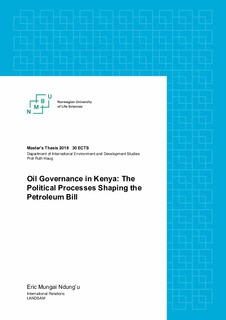| dc.contributor.advisor | Haug, Ruth | |
| dc.contributor.author | Ndungu, Eric Mungai | |
| dc.coverage.spatial | Kenya | nb_NO |
| dc.date.accessioned | 2019-02-08T12:13:32Z | |
| dc.date.available | 2019-02-08T12:13:32Z | |
| dc.date.issued | 2018 | |
| dc.identifier.uri | http://hdl.handle.net/11250/2584584 | |
| dc.description.abstract | This thesis investigates the politics of elite commitment to promoting the petroleum bill. Since Kenya discovered oil in 2012, the government has attempted to create an institution that will regulate the country’s nascent oil and gas sector. The national debate around the institution formulation – intended to steer Kenya from the resource curse - have followed a neo-institutionalist perspective.This perspective emphasizes the importance of forming specific types of institutions which can help contain and shape the elite commitment to developing oil resources effectively. Therefore, this thesis attempts to expand the horizon of the neo-institutionalist perspective by operationalizing the political settlements approach. Such an approach helps demonstrate that elite commitment is shaped by the expansive configuration of power, not by institutions. Legal documents, reports and public statements were investigated using qualitative thematic analysis. The analysis is based on a case study of the politics of formulating and adopting the petroleum bill, specifically the revenue sharing clause which was the major political point of contention. The thesis argues that the trends underlying Kenya’s competitive clientelist political system shaped the political commitment towards promoting the petroleum bill. Kenya’s competitive clientelist political settlement also produced incentives for the politicians to use the petroleum bill to bring certain opposing political elites into the ruling coalition. Through the political settlements approach, this thesis offers a richer political economy view into the drivers of elite commitment to governing oil and demonstrates that Kenya’s efforts to avoid the resource curse are determined by ‘power relations’ and ‘elite bargaining.’ | nb_NO |
| dc.language.iso | eng | nb_NO |
| dc.publisher | Norwegian University of Life Sciences, Ås | nb_NO |
| dc.rights | Attribution-NonCommercial-NoDerivatives 4.0 Internasjonal | * |
| dc.rights.uri | http://creativecommons.org/licenses/by-nc-nd/4.0/deed.no | * |
| dc.subject | Political Settlements | nb_NO |
| dc.title | Oil governance in Kenya : the political processes shaping the petroleum bill | nb_NO |
| dc.type | Master thesis | nb_NO |
| dc.source.pagenumber | 70 | nb_NO |
| dc.description.localcode | M-IR | nb_NO |

